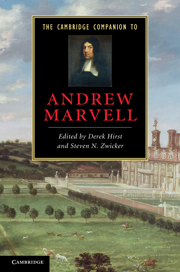Book contents
- Frontmatter
- 1 Introduction
- 2 The social modes of Marvell’s poetry
- 3 Marvell and the literary past
- 4 Borders and transitions in Marvell’s poetry
- 5 Thinking of gender
- 6 Marvell and the designs of art
- 7 Andrew Marvell’s citizenship
- 8 The green Marvell
- 9 A Cromwellian centre?
- 10 The poet’s religion
- 11 Adversarial Marvell
- 12 How to make a biography of Andrew Marvell
- Index
- Cambridge Companions to. . .
11 - Adversarial Marvell
Published online by Cambridge University Press: 28 March 2011
- Frontmatter
- 1 Introduction
- 2 The social modes of Marvell’s poetry
- 3 Marvell and the literary past
- 4 Borders and transitions in Marvell’s poetry
- 5 Thinking of gender
- 6 Marvell and the designs of art
- 7 Andrew Marvell’s citizenship
- 8 The green Marvell
- 9 A Cromwellian centre?
- 10 The poet’s religion
- 11 Adversarial Marvell
- 12 How to make a biography of Andrew Marvell
- Index
- Cambridge Companions to. . .
Summary
O Sir, we quarrel in print, by the book – as you have books for good manners. I will name you the degrees. The first, the Retort Courteous; the second, the Quip Modest; the third, the Reply Churlish; the fourth, the Reproof Valiant; the fift, the Countercheck Quarrelsome; the sixt, the Lie with Circumstance; the seventh, the Lie Direct.
(Touchstone, As You Like It, v.iv.90–6)As Touchstone’s points of honour suggest, Andrew Marvell’s career in print controversy engaged him in a culture of debate with a long and rich history. His skill in animadversion gave Marvell most of such reputation as he enjoyed by the end of his life. To animadvert is generally ‘to turn the mind to’ something, but as a term of art ‘animadversion’ denotes a genre of prose polemic that disputes a previous publication, often point by point. Other terms from Marvell’s day – such as ‘answers’, ‘reflections’, ‘observations’, ‘defence’, ‘reply’, ‘apology’, ‘remarks’, or even ‘remarks upon remarques’ – bespeak a similar style of confutation. But as well as specificity, the animus that can animate animadversion deserves emphasis, as when Marvell uses the term figuratively to comment on a brawl where some ‘Rusticks animadverted so severely upon’ the Earl of Rochester’s followers that one of them was killed (Letters, 345). The complex intertextuality we meet with in animadversions expresses differences in often vivid or even violent dispute. Marvell could turn on a text or an antagonist in ways that excited wonder in his readers then and since. His flair for reversal or retort – the turning at the root of ‘trope’ – distinguishes both his prose and poetry.
- Type
- Chapter
- Information
- The Cambridge Companion to Andrew Marvell , pp. 174 - 193Publisher: Cambridge University PressPrint publication year: 2010



